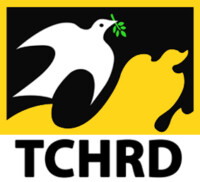Dorji Rapten is a 20-year-old monk. He reports since Chinese work-team entered his monastery, one monk has disappeared believed executed or imprisoned – and Dorji has just been released from prison. Dorji Rapten is from Dhayap Magon monastery in Pare township in Dhayap county, Kham (eastern Tibet). He was 11 years old when he joined the monastery.
Dorji reports that some time in 1993, two posters were stuck in Dhayap county. Soon afterwards, a work team of 120 men arrived at Bhugon monastery. Meetings were held and the rooms of the monks were ransacked. In the room of one monk named Tse-Tse, the work team found, among some scriptures, a Tibet flag and some documents.
The work-team linked Tse-Tse to the wall posters and he was immediately taken away. He was kept in Dhayap prison for 15 days before his trial and it was during that tune that Dorjee met him.
After sentencing, Tse-Tse was reportedly taken to Powo Tramo labour camp. There are rumours that Tse Tse has been executed while other sources say that he has been sentenced to life imprisonment. Tse Tse has not been seen since his sentencing.
In 1994, the Chinese work-team came to Dorjee’s monastery. Each day the three to five member work-team conducted re-education sessions. They quickly expelled all 30 monks who had joined the monastery after 1990.
In 1995, Dorjee took eight months leave and went with three other monks to Lhasa to acquire the vows for Getsul (to become a fully ordained monk). While travelling back to the monastery, Doti stopped in Dhayap county, taking shelter with a family. Dorji was carrying a small bag with him and, when the father asked him what he was carrying, Dorjee showed him the scriptures and photographs of the Dalai Lama. The father called the rest of the family and they held the photographs high on their head in respect. Dorjee returned to his monastery the next day.
Fifteen days after this incident, four men arrived in the village close to Dorji’s monastery. They said they were work-team members, but Dorji said they looked more like policemen. The men started asking Dorji about where he had come from recently and what he had in his possession. Dorji answered truthfully, admitting to possessing the photographs.
He was told to bring the photos to the men and then more questions followed, accompanied by ruthless beatings. The men asked him if he had got the photographs from abroad and, when Dorjee said that he had not, he was beaten even more savagely for “lying”. The interrogations went on for seven days and around the second week of March 1996, Dorjee was sentenced to three years prison. With the help of his uncle who knew someone in the county office, Dorjee was released on bail on March 22, 1997, after serving one year.
